A Detailed Report on Business Ethics at Inter IKEA Systems
VerifiedAdded on 2020/04/01
|12
|3722
|63
Report
AI Summary
This report provides a comprehensive analysis of the business ethics of Inter IKEA Systems. It begins with an abstract and introduction to business ethics, then outlines the objectives of the study, which include examining ethical issues and making recommendations for future improvements. The report discusses ethical issues faced by IKEA, such as acquisitions and stakeholder engagement, highlighting the company's adherence to ethical standards. It explores how IKEA's vision, mission, and IWAY code of practice influence its actions, offering examples. Furthermore, the report examines IKEA's CSR actions through the lens of Carroll's Four-Part Model, evaluating its economic, legal, ethical, and philanthropic activities. The report also identifies IKEA's key stakeholders and their relationship attributes, with a focus on customers and suppliers. The report concludes by summarizing IKEA's ethical standards and its commitment to sustainable growth and ethical business practices.
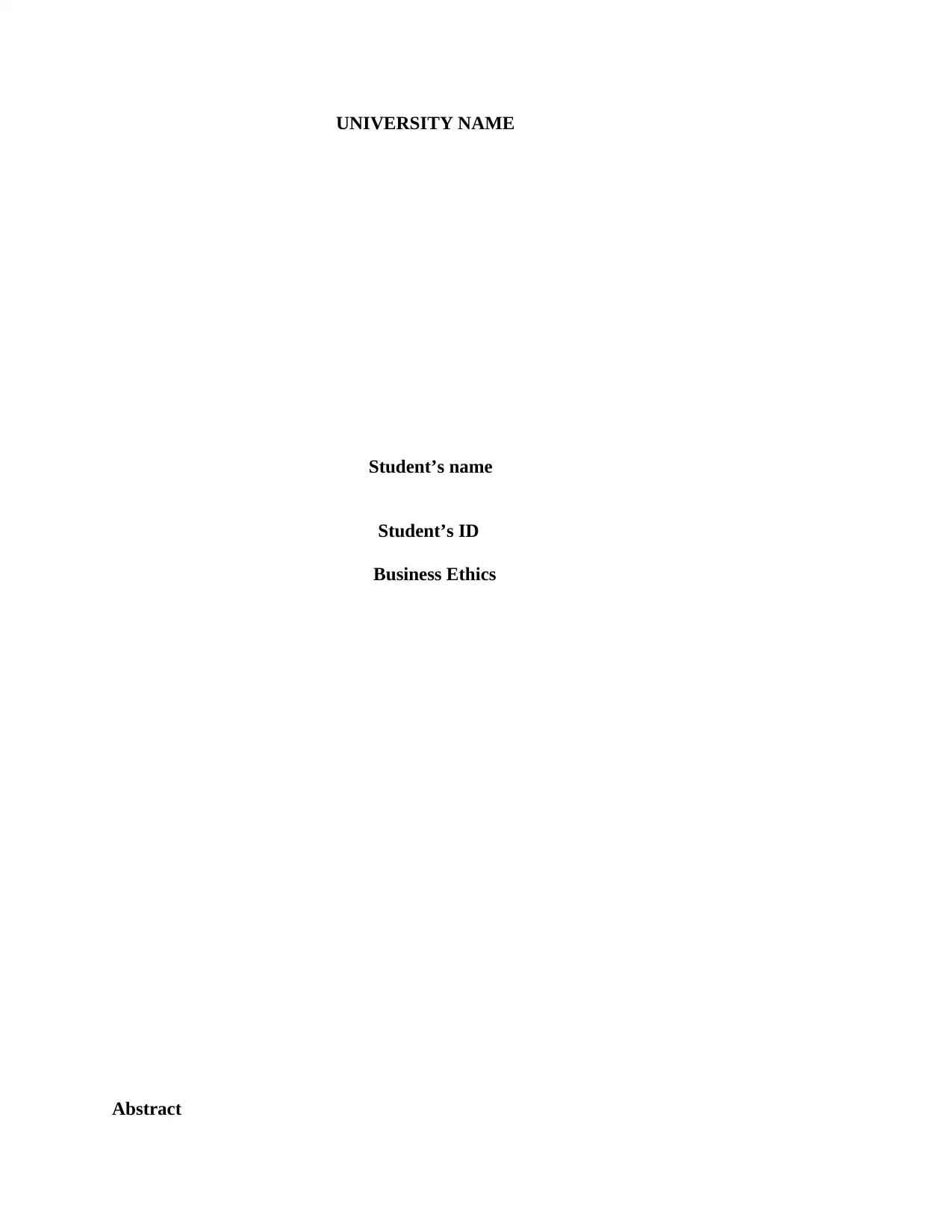
UNIVERSITY NAME
Student’s name
Student’s ID
Business Ethics
Abstract
Student’s name
Student’s ID
Business Ethics
Abstract
Paraphrase This Document
Need a fresh take? Get an instant paraphrase of this document with our AI Paraphraser
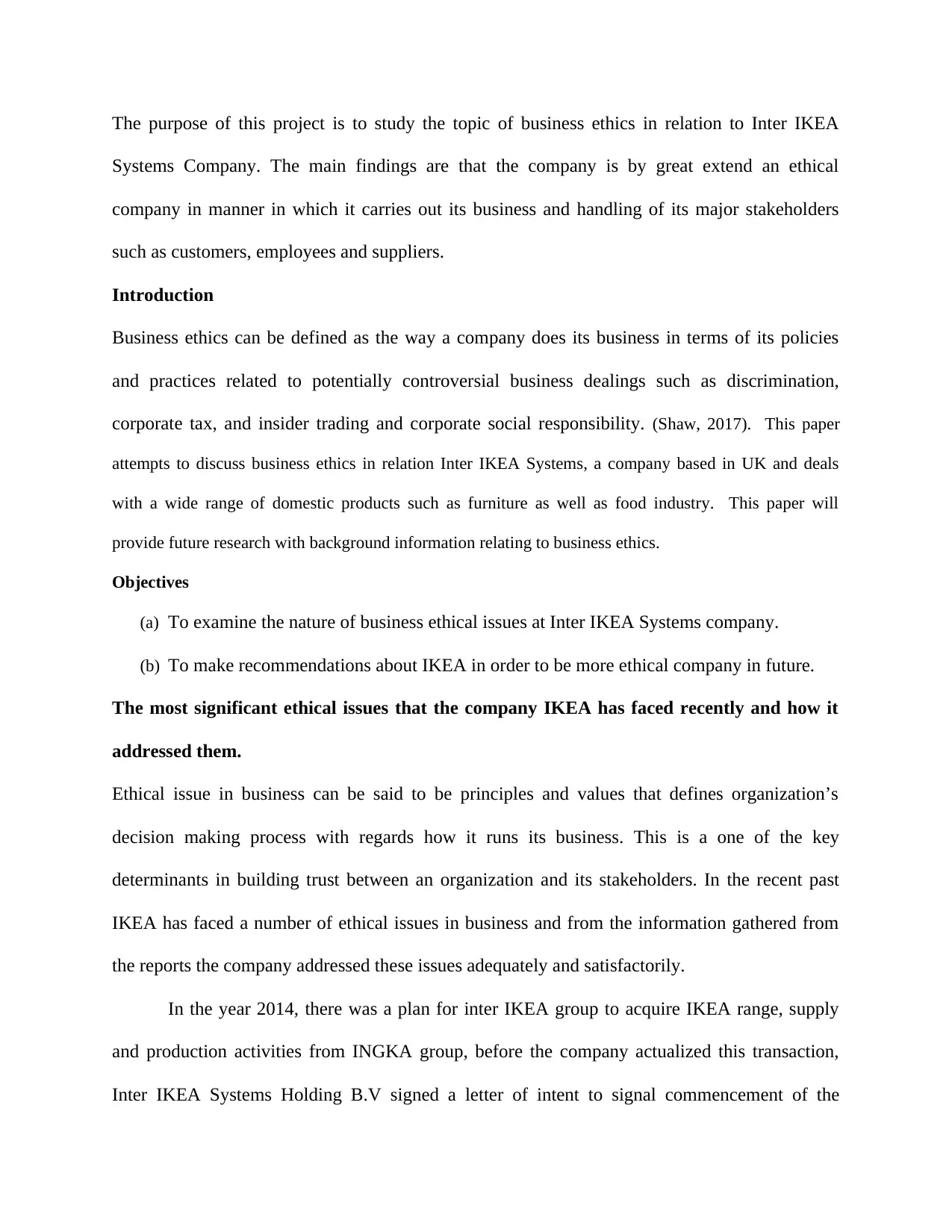
The purpose of this project is to study the topic of business ethics in relation to Inter IKEA
Systems Company. The main findings are that the company is by great extend an ethical
company in manner in which it carries out its business and handling of its major stakeholders
such as customers, employees and suppliers.
Introduction
Business ethics can be defined as the way a company does its business in terms of its policies
and practices related to potentially controversial business dealings such as discrimination,
corporate tax, and insider trading and corporate social responsibility. (Shaw, 2017). This paper
attempts to discuss business ethics in relation Inter IKEA Systems, a company based in UK and deals
with a wide range of domestic products such as furniture as well as food industry. This paper will
provide future research with background information relating to business ethics.
Objectives
(a) To examine the nature of business ethical issues at Inter IKEA Systems company.
(b) To make recommendations about IKEA in order to be more ethical company in future.
The most significant ethical issues that the company IKEA has faced recently and how it
addressed them.
Ethical issue in business can be said to be principles and values that defines organization’s
decision making process with regards how it runs its business. This is a one of the key
determinants in building trust between an organization and its stakeholders. In the recent past
IKEA has faced a number of ethical issues in business and from the information gathered from
the reports the company addressed these issues adequately and satisfactorily.
In the year 2014, there was a plan for inter IKEA group to acquire IKEA range, supply
and production activities from INGKA group, before the company actualized this transaction,
Inter IKEA Systems Holding B.V signed a letter of intent to signal commencement of the
Systems Company. The main findings are that the company is by great extend an ethical
company in manner in which it carries out its business and handling of its major stakeholders
such as customers, employees and suppliers.
Introduction
Business ethics can be defined as the way a company does its business in terms of its policies
and practices related to potentially controversial business dealings such as discrimination,
corporate tax, and insider trading and corporate social responsibility. (Shaw, 2017). This paper
attempts to discuss business ethics in relation Inter IKEA Systems, a company based in UK and deals
with a wide range of domestic products such as furniture as well as food industry. This paper will
provide future research with background information relating to business ethics.
Objectives
(a) To examine the nature of business ethical issues at Inter IKEA Systems company.
(b) To make recommendations about IKEA in order to be more ethical company in future.
The most significant ethical issues that the company IKEA has faced recently and how it
addressed them.
Ethical issue in business can be said to be principles and values that defines organization’s
decision making process with regards how it runs its business. This is a one of the key
determinants in building trust between an organization and its stakeholders. In the recent past
IKEA has faced a number of ethical issues in business and from the information gathered from
the reports the company addressed these issues adequately and satisfactorily.
In the year 2014, there was a plan for inter IKEA group to acquire IKEA range, supply
and production activities from INGKA group, before the company actualized this transaction,
Inter IKEA Systems Holding B.V signed a letter of intent to signal commencement of the
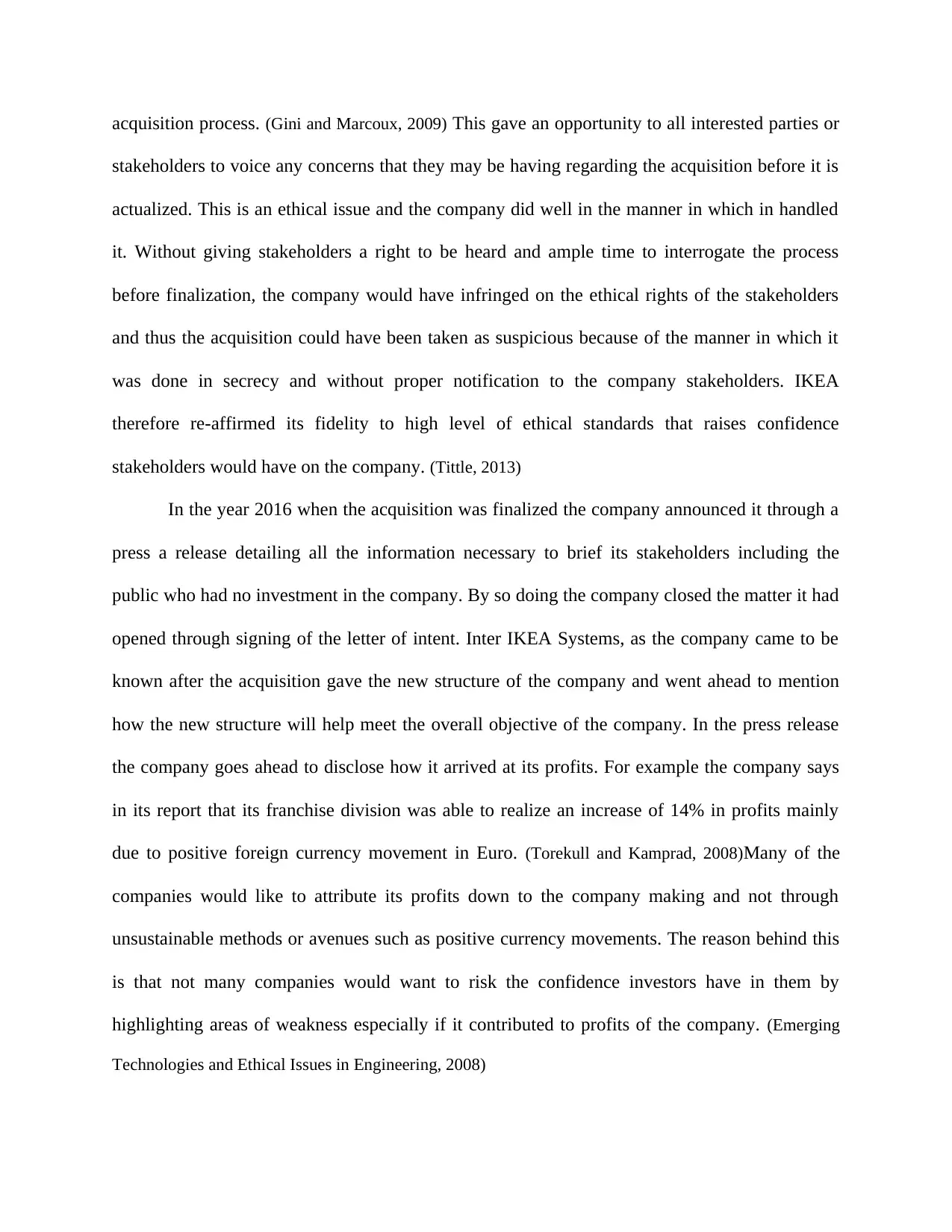
acquisition process. (Gini and Marcoux, 2009) This gave an opportunity to all interested parties or
stakeholders to voice any concerns that they may be having regarding the acquisition before it is
actualized. This is an ethical issue and the company did well in the manner in which in handled
it. Without giving stakeholders a right to be heard and ample time to interrogate the process
before finalization, the company would have infringed on the ethical rights of the stakeholders
and thus the acquisition could have been taken as suspicious because of the manner in which it
was done in secrecy and without proper notification to the company stakeholders. IKEA
therefore re-affirmed its fidelity to high level of ethical standards that raises confidence
stakeholders would have on the company. (Tittle, 2013)
In the year 2016 when the acquisition was finalized the company announced it through a
press a release detailing all the information necessary to brief its stakeholders including the
public who had no investment in the company. By so doing the company closed the matter it had
opened through signing of the letter of intent. Inter IKEA Systems, as the company came to be
known after the acquisition gave the new structure of the company and went ahead to mention
how the new structure will help meet the overall objective of the company. In the press release
the company goes ahead to disclose how it arrived at its profits. For example the company says
in its report that its franchise division was able to realize an increase of 14% in profits mainly
due to positive foreign currency movement in Euro. (Torekull and Kamprad, 2008)Many of the
companies would like to attribute its profits down to the company making and not through
unsustainable methods or avenues such as positive currency movements. The reason behind this
is that not many companies would want to risk the confidence investors have in them by
highlighting areas of weakness especially if it contributed to profits of the company. (Emerging
Technologies and Ethical Issues in Engineering, 2008)
stakeholders to voice any concerns that they may be having regarding the acquisition before it is
actualized. This is an ethical issue and the company did well in the manner in which in handled
it. Without giving stakeholders a right to be heard and ample time to interrogate the process
before finalization, the company would have infringed on the ethical rights of the stakeholders
and thus the acquisition could have been taken as suspicious because of the manner in which it
was done in secrecy and without proper notification to the company stakeholders. IKEA
therefore re-affirmed its fidelity to high level of ethical standards that raises confidence
stakeholders would have on the company. (Tittle, 2013)
In the year 2016 when the acquisition was finalized the company announced it through a
press a release detailing all the information necessary to brief its stakeholders including the
public who had no investment in the company. By so doing the company closed the matter it had
opened through signing of the letter of intent. Inter IKEA Systems, as the company came to be
known after the acquisition gave the new structure of the company and went ahead to mention
how the new structure will help meet the overall objective of the company. In the press release
the company goes ahead to disclose how it arrived at its profits. For example the company says
in its report that its franchise division was able to realize an increase of 14% in profits mainly
due to positive foreign currency movement in Euro. (Torekull and Kamprad, 2008)Many of the
companies would like to attribute its profits down to the company making and not through
unsustainable methods or avenues such as positive currency movements. The reason behind this
is that not many companies would want to risk the confidence investors have in them by
highlighting areas of weakness especially if it contributed to profits of the company. (Emerging
Technologies and Ethical Issues in Engineering, 2008)
⊘ This is a preview!⊘
Do you want full access?
Subscribe today to unlock all pages.

Trusted by 1+ million students worldwide
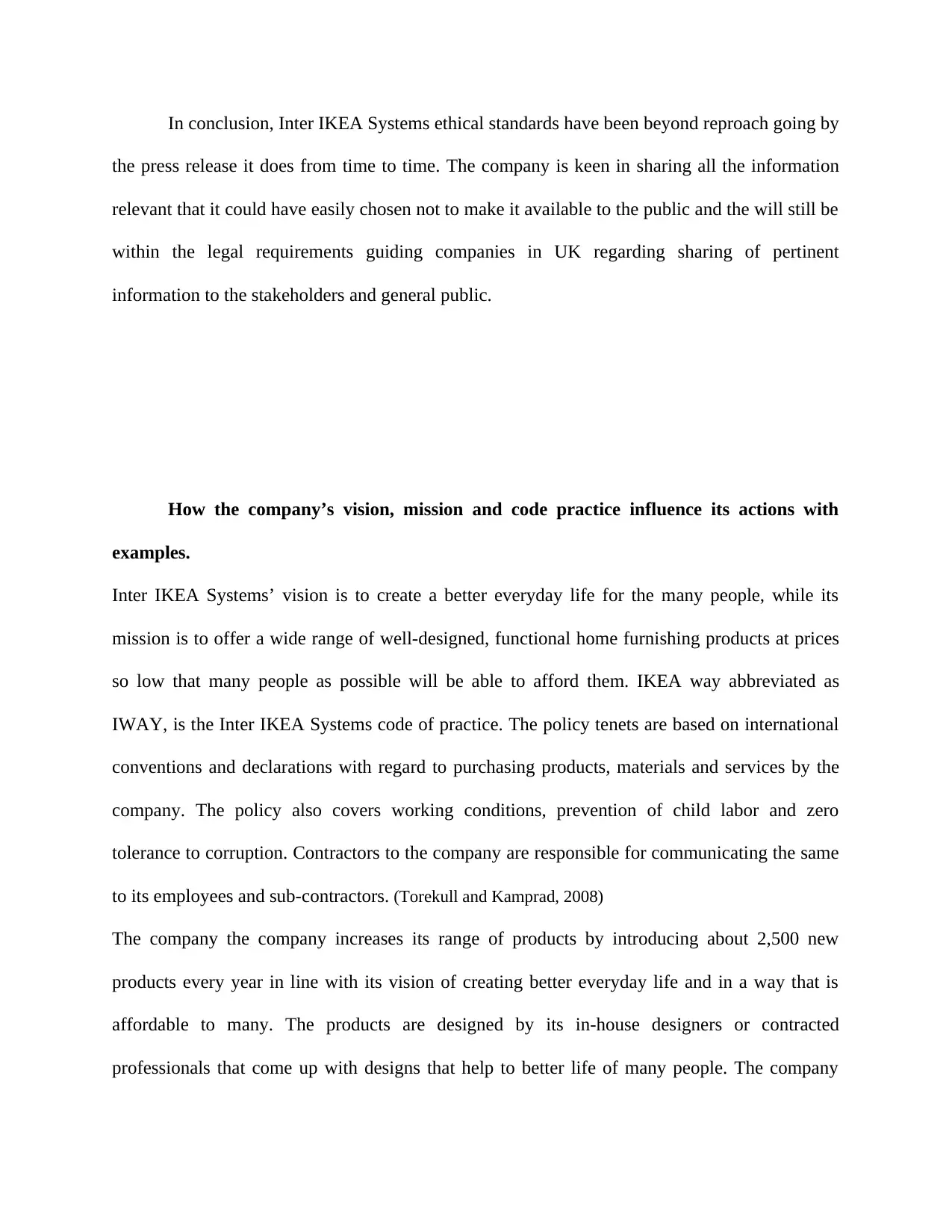
In conclusion, Inter IKEA Systems ethical standards have been beyond reproach going by
the press release it does from time to time. The company is keen in sharing all the information
relevant that it could have easily chosen not to make it available to the public and the will still be
within the legal requirements guiding companies in UK regarding sharing of pertinent
information to the stakeholders and general public.
How the company’s vision, mission and code practice influence its actions with
examples.
Inter IKEA Systems’ vision is to create a better everyday life for the many people, while its
mission is to offer a wide range of well-designed, functional home furnishing products at prices
so low that many people as possible will be able to afford them. IKEA way abbreviated as
IWAY, is the Inter IKEA Systems code of practice. The policy tenets are based on international
conventions and declarations with regard to purchasing products, materials and services by the
company. The policy also covers working conditions, prevention of child labor and zero
tolerance to corruption. Contractors to the company are responsible for communicating the same
to its employees and sub-contractors. (Torekull and Kamprad, 2008)
The company the company increases its range of products by introducing about 2,500 new
products every year in line with its vision of creating better everyday life and in a way that is
affordable to many. The products are designed by its in-house designers or contracted
professionals that come up with designs that help to better life of many people. The company
the press release it does from time to time. The company is keen in sharing all the information
relevant that it could have easily chosen not to make it available to the public and the will still be
within the legal requirements guiding companies in UK regarding sharing of pertinent
information to the stakeholders and general public.
How the company’s vision, mission and code practice influence its actions with
examples.
Inter IKEA Systems’ vision is to create a better everyday life for the many people, while its
mission is to offer a wide range of well-designed, functional home furnishing products at prices
so low that many people as possible will be able to afford them. IKEA way abbreviated as
IWAY, is the Inter IKEA Systems code of practice. The policy tenets are based on international
conventions and declarations with regard to purchasing products, materials and services by the
company. The policy also covers working conditions, prevention of child labor and zero
tolerance to corruption. Contractors to the company are responsible for communicating the same
to its employees and sub-contractors. (Torekull and Kamprad, 2008)
The company the company increases its range of products by introducing about 2,500 new
products every year in line with its vision of creating better everyday life and in a way that is
affordable to many. The products are designed by its in-house designers or contracted
professionals that come up with designs that help to better life of many people. The company
Paraphrase This Document
Need a fresh take? Get an instant paraphrase of this document with our AI Paraphraser
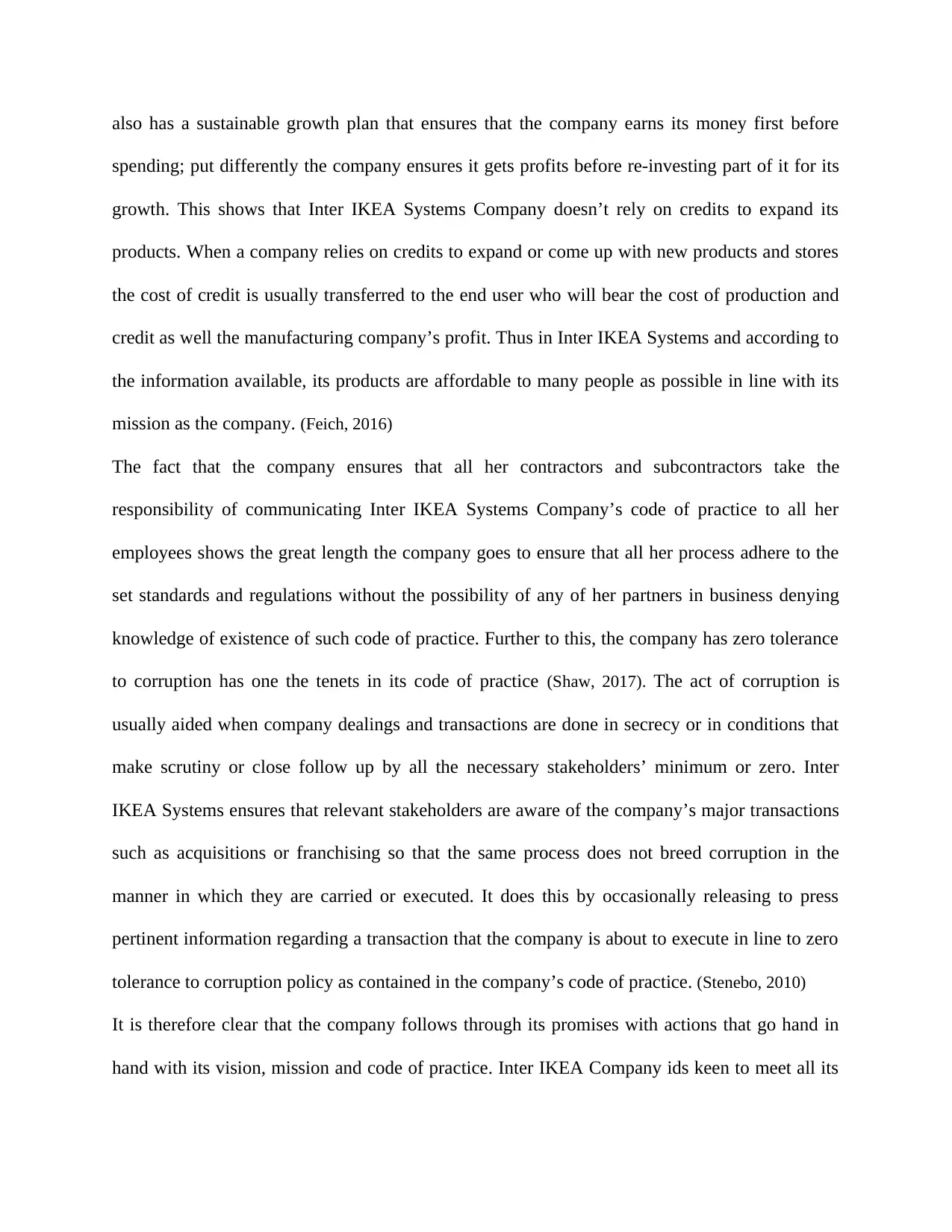
also has a sustainable growth plan that ensures that the company earns its money first before
spending; put differently the company ensures it gets profits before re-investing part of it for its
growth. This shows that Inter IKEA Systems Company doesn’t rely on credits to expand its
products. When a company relies on credits to expand or come up with new products and stores
the cost of credit is usually transferred to the end user who will bear the cost of production and
credit as well the manufacturing company’s profit. Thus in Inter IKEA Systems and according to
the information available, its products are affordable to many people as possible in line with its
mission as the company. (Feich, 2016)
The fact that the company ensures that all her contractors and subcontractors take the
responsibility of communicating Inter IKEA Systems Company’s code of practice to all her
employees shows the great length the company goes to ensure that all her process adhere to the
set standards and regulations without the possibility of any of her partners in business denying
knowledge of existence of such code of practice. Further to this, the company has zero tolerance
to corruption has one the tenets in its code of practice (Shaw, 2017). The act of corruption is
usually aided when company dealings and transactions are done in secrecy or in conditions that
make scrutiny or close follow up by all the necessary stakeholders’ minimum or zero. Inter
IKEA Systems ensures that relevant stakeholders are aware of the company’s major transactions
such as acquisitions or franchising so that the same process does not breed corruption in the
manner in which they are carried or executed. It does this by occasionally releasing to press
pertinent information regarding a transaction that the company is about to execute in line to zero
tolerance to corruption policy as contained in the company’s code of practice. (Stenebo, 2010)
It is therefore clear that the company follows through its promises with actions that go hand in
hand with its vision, mission and code of practice. Inter IKEA Company ids keen to meet all its
spending; put differently the company ensures it gets profits before re-investing part of it for its
growth. This shows that Inter IKEA Systems Company doesn’t rely on credits to expand its
products. When a company relies on credits to expand or come up with new products and stores
the cost of credit is usually transferred to the end user who will bear the cost of production and
credit as well the manufacturing company’s profit. Thus in Inter IKEA Systems and according to
the information available, its products are affordable to many people as possible in line with its
mission as the company. (Feich, 2016)
The fact that the company ensures that all her contractors and subcontractors take the
responsibility of communicating Inter IKEA Systems Company’s code of practice to all her
employees shows the great length the company goes to ensure that all her process adhere to the
set standards and regulations without the possibility of any of her partners in business denying
knowledge of existence of such code of practice. Further to this, the company has zero tolerance
to corruption has one the tenets in its code of practice (Shaw, 2017). The act of corruption is
usually aided when company dealings and transactions are done in secrecy or in conditions that
make scrutiny or close follow up by all the necessary stakeholders’ minimum or zero. Inter
IKEA Systems ensures that relevant stakeholders are aware of the company’s major transactions
such as acquisitions or franchising so that the same process does not breed corruption in the
manner in which they are carried or executed. It does this by occasionally releasing to press
pertinent information regarding a transaction that the company is about to execute in line to zero
tolerance to corruption policy as contained in the company’s code of practice. (Stenebo, 2010)
It is therefore clear that the company follows through its promises with actions that go hand in
hand with its vision, mission and code of practice. Inter IKEA Company ids keen to meet all its
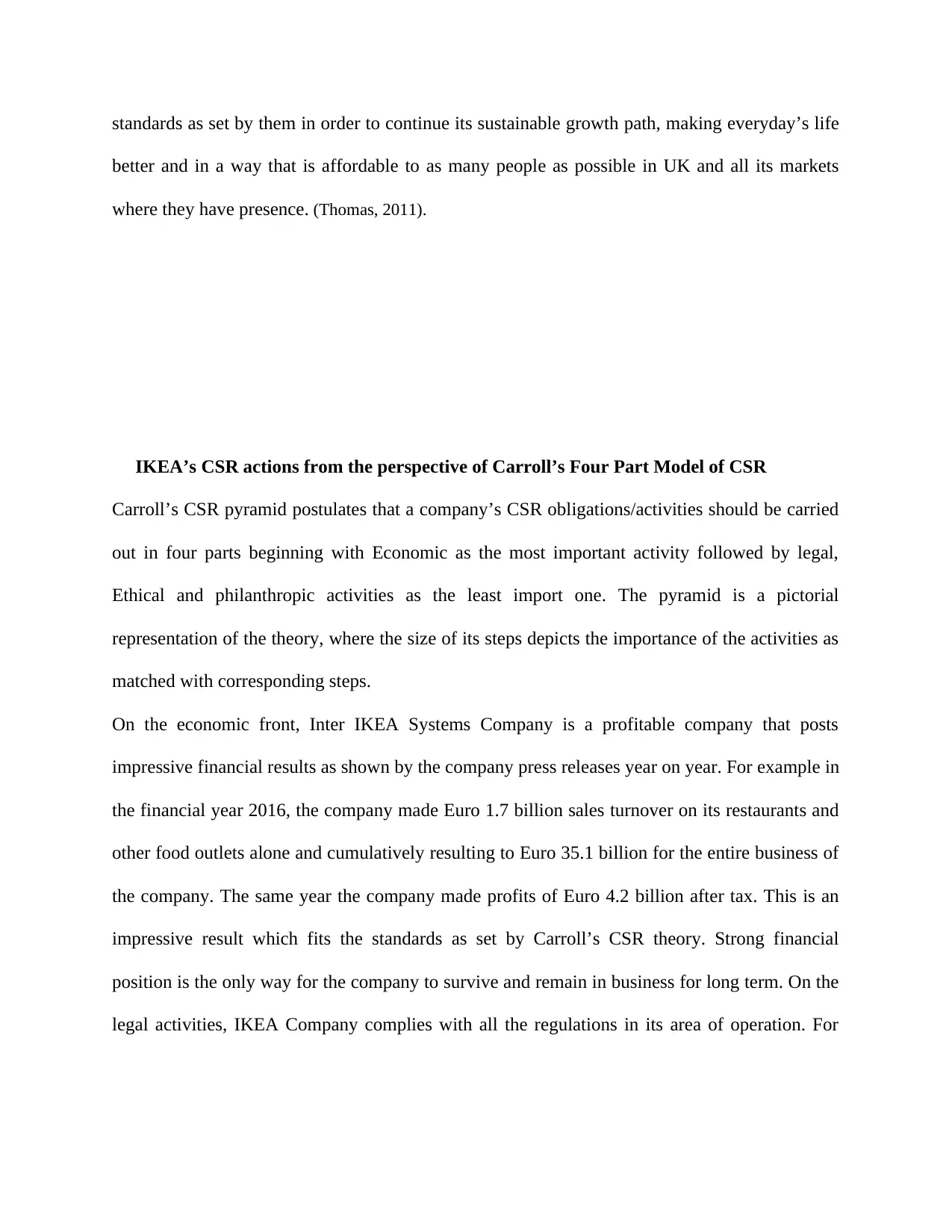
standards as set by them in order to continue its sustainable growth path, making everyday’s life
better and in a way that is affordable to as many people as possible in UK and all its markets
where they have presence. (Thomas, 2011).
IKEA’s CSR actions from the perspective of Carroll’s Four Part Model of CSR
Carroll’s CSR pyramid postulates that a company’s CSR obligations/activities should be carried
out in four parts beginning with Economic as the most important activity followed by legal,
Ethical and philanthropic activities as the least import one. The pyramid is a pictorial
representation of the theory, where the size of its steps depicts the importance of the activities as
matched with corresponding steps.
On the economic front, Inter IKEA Systems Company is a profitable company that posts
impressive financial results as shown by the company press releases year on year. For example in
the financial year 2016, the company made Euro 1.7 billion sales turnover on its restaurants and
other food outlets alone and cumulatively resulting to Euro 35.1 billion for the entire business of
the company. The same year the company made profits of Euro 4.2 billion after tax. This is an
impressive result which fits the standards as set by Carroll’s CSR theory. Strong financial
position is the only way for the company to survive and remain in business for long term. On the
legal activities, IKEA Company complies with all the regulations in its area of operation. For
better and in a way that is affordable to as many people as possible in UK and all its markets
where they have presence. (Thomas, 2011).
IKEA’s CSR actions from the perspective of Carroll’s Four Part Model of CSR
Carroll’s CSR pyramid postulates that a company’s CSR obligations/activities should be carried
out in four parts beginning with Economic as the most important activity followed by legal,
Ethical and philanthropic activities as the least import one. The pyramid is a pictorial
representation of the theory, where the size of its steps depicts the importance of the activities as
matched with corresponding steps.
On the economic front, Inter IKEA Systems Company is a profitable company that posts
impressive financial results as shown by the company press releases year on year. For example in
the financial year 2016, the company made Euro 1.7 billion sales turnover on its restaurants and
other food outlets alone and cumulatively resulting to Euro 35.1 billion for the entire business of
the company. The same year the company made profits of Euro 4.2 billion after tax. This is an
impressive result which fits the standards as set by Carroll’s CSR theory. Strong financial
position is the only way for the company to survive and remain in business for long term. On the
legal activities, IKEA Company complies with all the regulations in its area of operation. For
⊘ This is a preview!⊘
Do you want full access?
Subscribe today to unlock all pages.

Trusted by 1+ million students worldwide
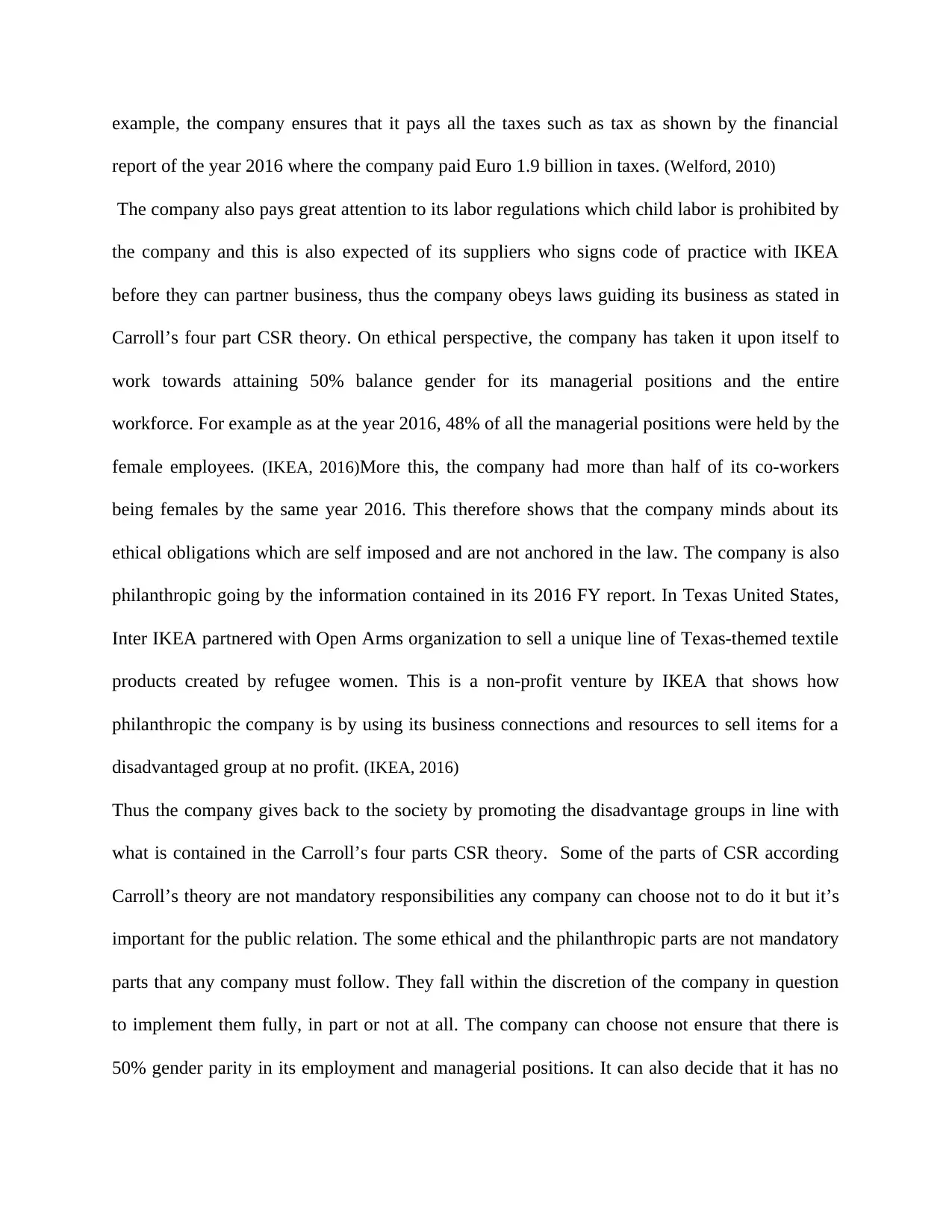
example, the company ensures that it pays all the taxes such as tax as shown by the financial
report of the year 2016 where the company paid Euro 1.9 billion in taxes. (Welford, 2010)
The company also pays great attention to its labor regulations which child labor is prohibited by
the company and this is also expected of its suppliers who signs code of practice with IKEA
before they can partner business, thus the company obeys laws guiding its business as stated in
Carroll’s four part CSR theory. On ethical perspective, the company has taken it upon itself to
work towards attaining 50% balance gender for its managerial positions and the entire
workforce. For example as at the year 2016, 48% of all the managerial positions were held by the
female employees. (IKEA, 2016)More this, the company had more than half of its co-workers
being females by the same year 2016. This therefore shows that the company minds about its
ethical obligations which are self imposed and are not anchored in the law. The company is also
philanthropic going by the information contained in its 2016 FY report. In Texas United States,
Inter IKEA partnered with Open Arms organization to sell a unique line of Texas-themed textile
products created by refugee women. This is a non-profit venture by IKEA that shows how
philanthropic the company is by using its business connections and resources to sell items for a
disadvantaged group at no profit. (IKEA, 2016)
Thus the company gives back to the society by promoting the disadvantage groups in line with
what is contained in the Carroll’s four parts CSR theory. Some of the parts of CSR according
Carroll’s theory are not mandatory responsibilities any company can choose not to do it but it’s
important for the public relation. The some ethical and the philanthropic parts are not mandatory
parts that any company must follow. They fall within the discretion of the company in question
to implement them fully, in part or not at all. The company can choose not ensure that there is
50% gender parity in its employment and managerial positions. It can also decide that it has no
report of the year 2016 where the company paid Euro 1.9 billion in taxes. (Welford, 2010)
The company also pays great attention to its labor regulations which child labor is prohibited by
the company and this is also expected of its suppliers who signs code of practice with IKEA
before they can partner business, thus the company obeys laws guiding its business as stated in
Carroll’s four part CSR theory. On ethical perspective, the company has taken it upon itself to
work towards attaining 50% balance gender for its managerial positions and the entire
workforce. For example as at the year 2016, 48% of all the managerial positions were held by the
female employees. (IKEA, 2016)More this, the company had more than half of its co-workers
being females by the same year 2016. This therefore shows that the company minds about its
ethical obligations which are self imposed and are not anchored in the law. The company is also
philanthropic going by the information contained in its 2016 FY report. In Texas United States,
Inter IKEA partnered with Open Arms organization to sell a unique line of Texas-themed textile
products created by refugee women. This is a non-profit venture by IKEA that shows how
philanthropic the company is by using its business connections and resources to sell items for a
disadvantaged group at no profit. (IKEA, 2016)
Thus the company gives back to the society by promoting the disadvantage groups in line with
what is contained in the Carroll’s four parts CSR theory. Some of the parts of CSR according
Carroll’s theory are not mandatory responsibilities any company can choose not to do it but it’s
important for the public relation. The some ethical and the philanthropic parts are not mandatory
parts that any company must follow. They fall within the discretion of the company in question
to implement them fully, in part or not at all. The company can choose not ensure that there is
50% gender parity in its employment and managerial positions. It can also decide that it has no
Paraphrase This Document
Need a fresh take? Get an instant paraphrase of this document with our AI Paraphraser
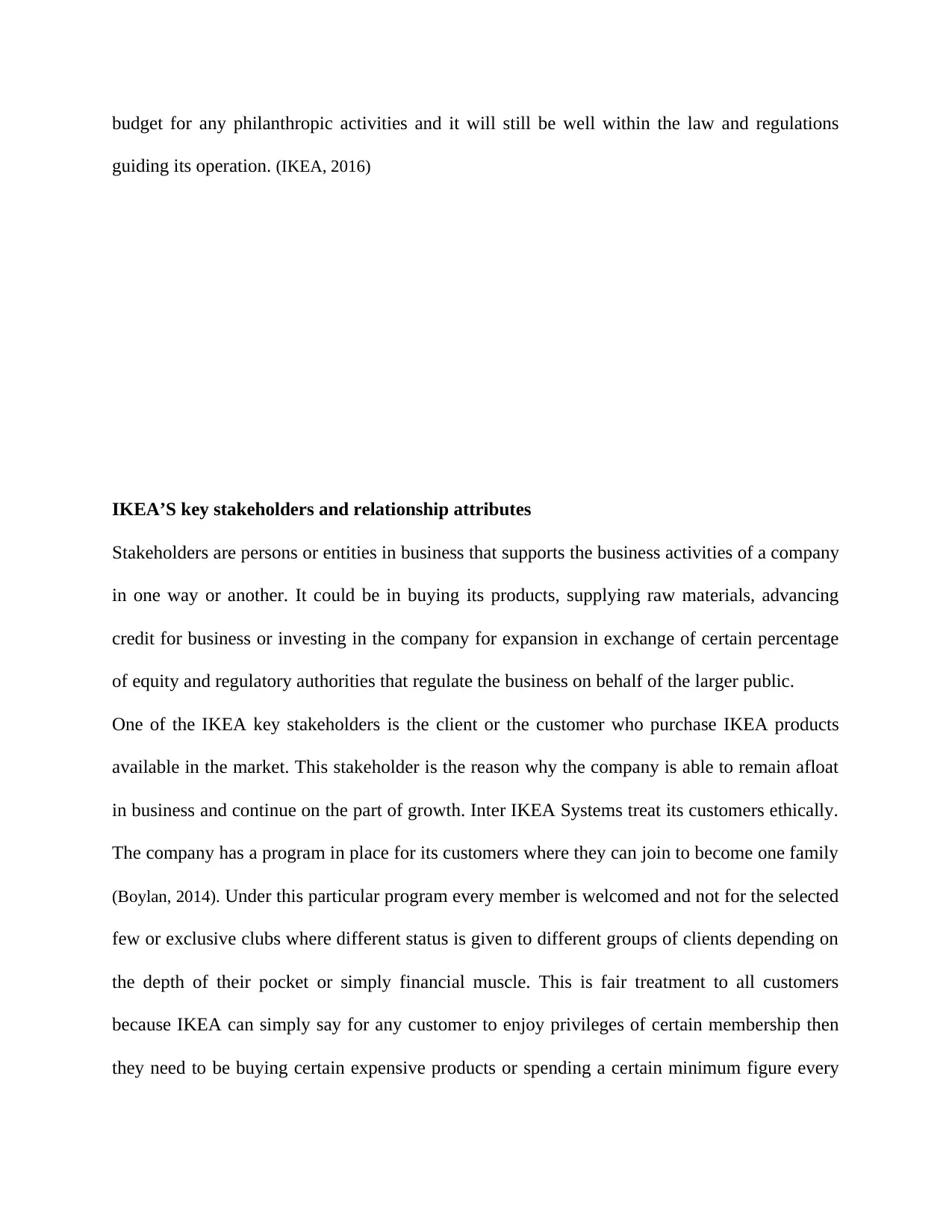
budget for any philanthropic activities and it will still be well within the law and regulations
guiding its operation. (IKEA, 2016)
IKEA’S key stakeholders and relationship attributes
Stakeholders are persons or entities in business that supports the business activities of a company
in one way or another. It could be in buying its products, supplying raw materials, advancing
credit for business or investing in the company for expansion in exchange of certain percentage
of equity and regulatory authorities that regulate the business on behalf of the larger public.
One of the IKEA key stakeholders is the client or the customer who purchase IKEA products
available in the market. This stakeholder is the reason why the company is able to remain afloat
in business and continue on the part of growth. Inter IKEA Systems treat its customers ethically.
The company has a program in place for its customers where they can join to become one family
(Boylan, 2014). Under this particular program every member is welcomed and not for the selected
few or exclusive clubs where different status is given to different groups of clients depending on
the depth of their pocket or simply financial muscle. This is fair treatment to all customers
because IKEA can simply say for any customer to enjoy privileges of certain membership then
they need to be buying certain expensive products or spending a certain minimum figure every
guiding its operation. (IKEA, 2016)
IKEA’S key stakeholders and relationship attributes
Stakeholders are persons or entities in business that supports the business activities of a company
in one way or another. It could be in buying its products, supplying raw materials, advancing
credit for business or investing in the company for expansion in exchange of certain percentage
of equity and regulatory authorities that regulate the business on behalf of the larger public.
One of the IKEA key stakeholders is the client or the customer who purchase IKEA products
available in the market. This stakeholder is the reason why the company is able to remain afloat
in business and continue on the part of growth. Inter IKEA Systems treat its customers ethically.
The company has a program in place for its customers where they can join to become one family
(Boylan, 2014). Under this particular program every member is welcomed and not for the selected
few or exclusive clubs where different status is given to different groups of clients depending on
the depth of their pocket or simply financial muscle. This is fair treatment to all customers
because IKEA can simply say for any customer to enjoy privileges of certain membership then
they need to be buying certain expensive products or spending a certain minimum figure every
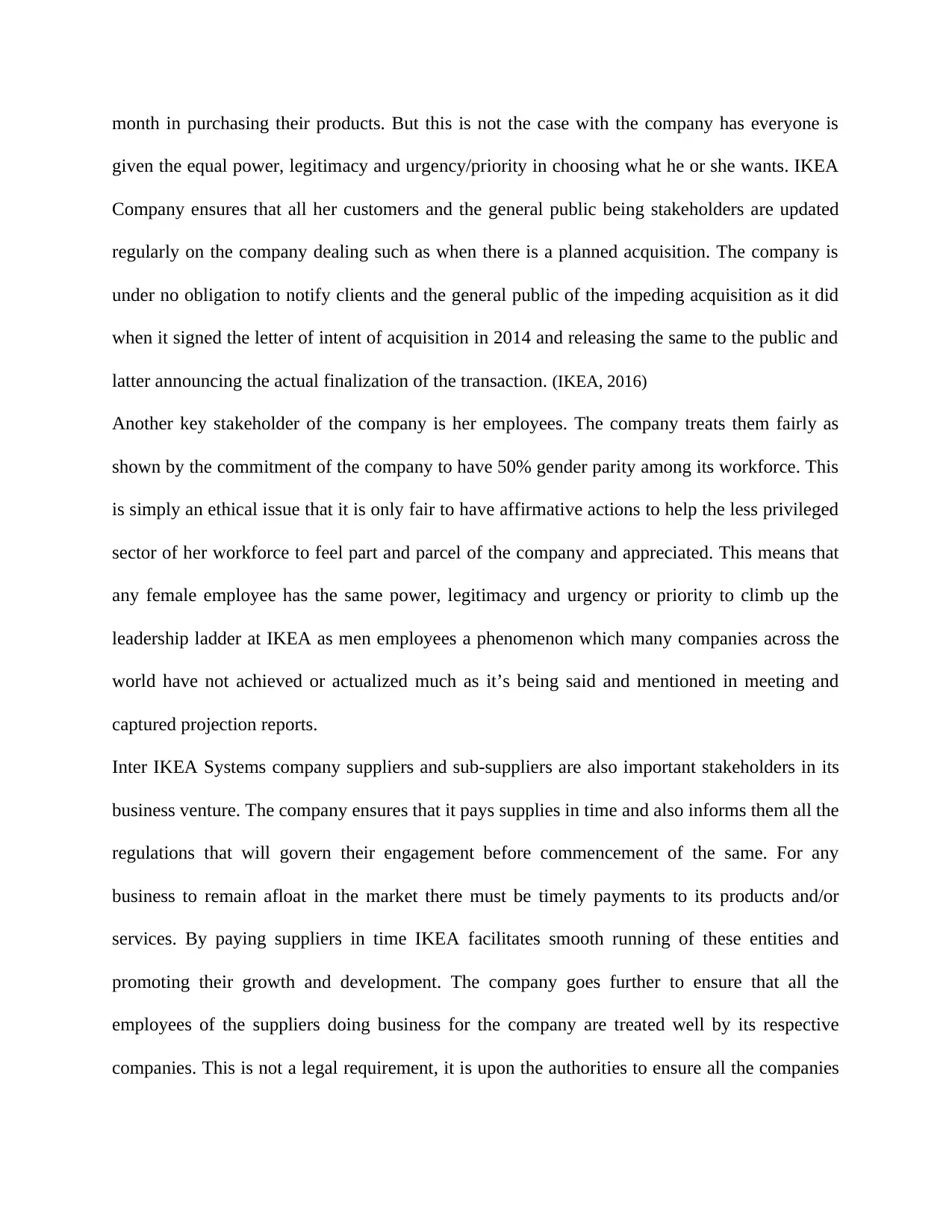
month in purchasing their products. But this is not the case with the company has everyone is
given the equal power, legitimacy and urgency/priority in choosing what he or she wants. IKEA
Company ensures that all her customers and the general public being stakeholders are updated
regularly on the company dealing such as when there is a planned acquisition. The company is
under no obligation to notify clients and the general public of the impeding acquisition as it did
when it signed the letter of intent of acquisition in 2014 and releasing the same to the public and
latter announcing the actual finalization of the transaction. (IKEA, 2016)
Another key stakeholder of the company is her employees. The company treats them fairly as
shown by the commitment of the company to have 50% gender parity among its workforce. This
is simply an ethical issue that it is only fair to have affirmative actions to help the less privileged
sector of her workforce to feel part and parcel of the company and appreciated. This means that
any female employee has the same power, legitimacy and urgency or priority to climb up the
leadership ladder at IKEA as men employees a phenomenon which many companies across the
world have not achieved or actualized much as it’s being said and mentioned in meeting and
captured projection reports.
Inter IKEA Systems company suppliers and sub-suppliers are also important stakeholders in its
business venture. The company ensures that it pays supplies in time and also informs them all the
regulations that will govern their engagement before commencement of the same. For any
business to remain afloat in the market there must be timely payments to its products and/or
services. By paying suppliers in time IKEA facilitates smooth running of these entities and
promoting their growth and development. The company goes further to ensure that all the
employees of the suppliers doing business for the company are treated well by its respective
companies. This is not a legal requirement, it is upon the authorities to ensure all the companies
given the equal power, legitimacy and urgency/priority in choosing what he or she wants. IKEA
Company ensures that all her customers and the general public being stakeholders are updated
regularly on the company dealing such as when there is a planned acquisition. The company is
under no obligation to notify clients and the general public of the impeding acquisition as it did
when it signed the letter of intent of acquisition in 2014 and releasing the same to the public and
latter announcing the actual finalization of the transaction. (IKEA, 2016)
Another key stakeholder of the company is her employees. The company treats them fairly as
shown by the commitment of the company to have 50% gender parity among its workforce. This
is simply an ethical issue that it is only fair to have affirmative actions to help the less privileged
sector of her workforce to feel part and parcel of the company and appreciated. This means that
any female employee has the same power, legitimacy and urgency or priority to climb up the
leadership ladder at IKEA as men employees a phenomenon which many companies across the
world have not achieved or actualized much as it’s being said and mentioned in meeting and
captured projection reports.
Inter IKEA Systems company suppliers and sub-suppliers are also important stakeholders in its
business venture. The company ensures that it pays supplies in time and also informs them all the
regulations that will govern their engagement before commencement of the same. For any
business to remain afloat in the market there must be timely payments to its products and/or
services. By paying suppliers in time IKEA facilitates smooth running of these entities and
promoting their growth and development. The company goes further to ensure that all the
employees of the suppliers doing business for the company are treated well by its respective
companies. This is not a legal requirement, it is upon the authorities to ensure all the companies
⊘ This is a preview!⊘
Do you want full access?
Subscribe today to unlock all pages.

Trusted by 1+ million students worldwide
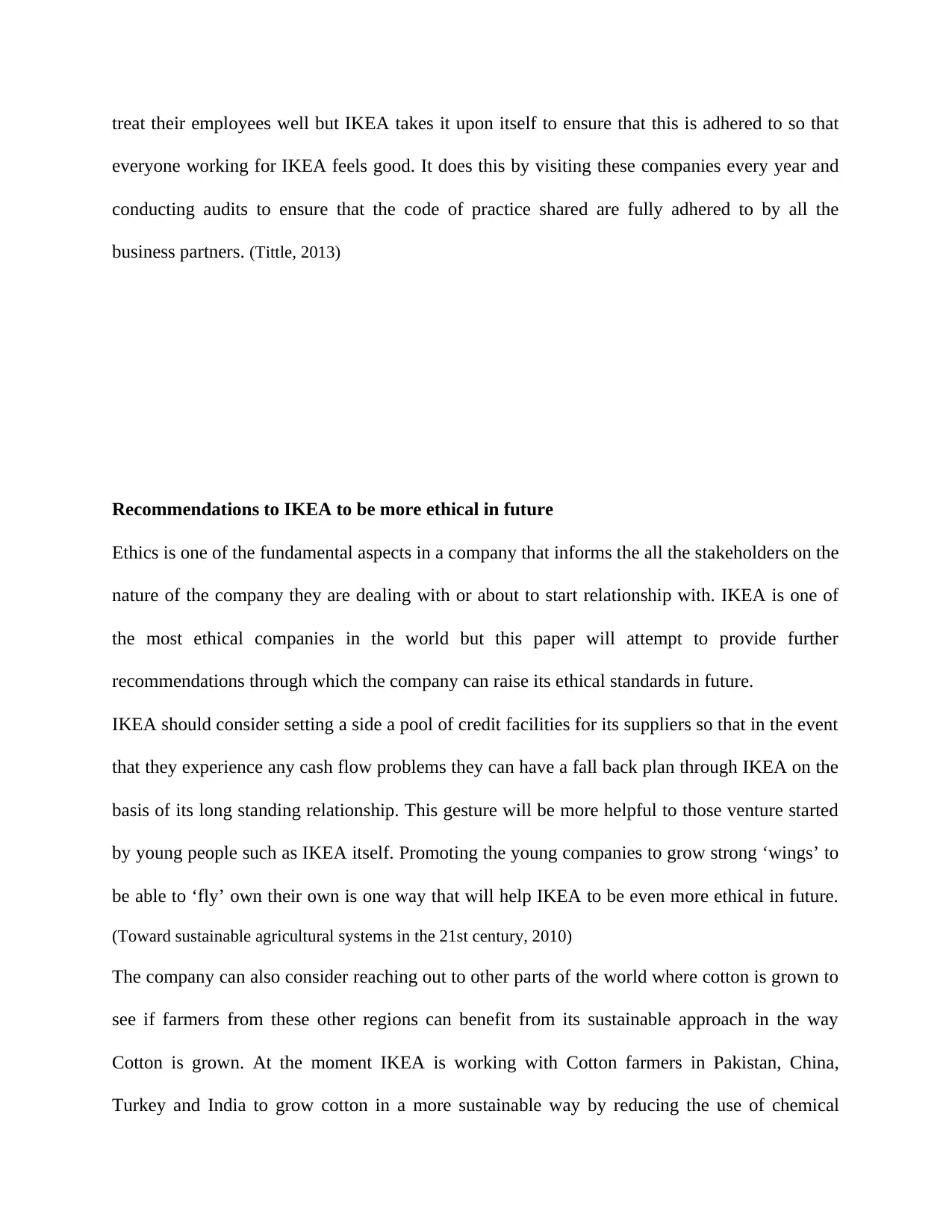
treat their employees well but IKEA takes it upon itself to ensure that this is adhered to so that
everyone working for IKEA feels good. It does this by visiting these companies every year and
conducting audits to ensure that the code of practice shared are fully adhered to by all the
business partners. (Tittle, 2013)
Recommendations to IKEA to be more ethical in future
Ethics is one of the fundamental aspects in a company that informs the all the stakeholders on the
nature of the company they are dealing with or about to start relationship with. IKEA is one of
the most ethical companies in the world but this paper will attempt to provide further
recommendations through which the company can raise its ethical standards in future.
IKEA should consider setting a side a pool of credit facilities for its suppliers so that in the event
that they experience any cash flow problems they can have a fall back plan through IKEA on the
basis of its long standing relationship. This gesture will be more helpful to those venture started
by young people such as IKEA itself. Promoting the young companies to grow strong ‘wings’ to
be able to ‘fly’ own their own is one way that will help IKEA to be even more ethical in future.
(Toward sustainable agricultural systems in the 21st century, 2010)
The company can also consider reaching out to other parts of the world where cotton is grown to
see if farmers from these other regions can benefit from its sustainable approach in the way
Cotton is grown. At the moment IKEA is working with Cotton farmers in Pakistan, China,
Turkey and India to grow cotton in a more sustainable way by reducing the use of chemical
everyone working for IKEA feels good. It does this by visiting these companies every year and
conducting audits to ensure that the code of practice shared are fully adhered to by all the
business partners. (Tittle, 2013)
Recommendations to IKEA to be more ethical in future
Ethics is one of the fundamental aspects in a company that informs the all the stakeholders on the
nature of the company they are dealing with or about to start relationship with. IKEA is one of
the most ethical companies in the world but this paper will attempt to provide further
recommendations through which the company can raise its ethical standards in future.
IKEA should consider setting a side a pool of credit facilities for its suppliers so that in the event
that they experience any cash flow problems they can have a fall back plan through IKEA on the
basis of its long standing relationship. This gesture will be more helpful to those venture started
by young people such as IKEA itself. Promoting the young companies to grow strong ‘wings’ to
be able to ‘fly’ own their own is one way that will help IKEA to be even more ethical in future.
(Toward sustainable agricultural systems in the 21st century, 2010)
The company can also consider reaching out to other parts of the world where cotton is grown to
see if farmers from these other regions can benefit from its sustainable approach in the way
Cotton is grown. At the moment IKEA is working with Cotton farmers in Pakistan, China,
Turkey and India to grow cotton in a more sustainable way by reducing the use of chemical
Paraphrase This Document
Need a fresh take? Get an instant paraphrase of this document with our AI Paraphraser
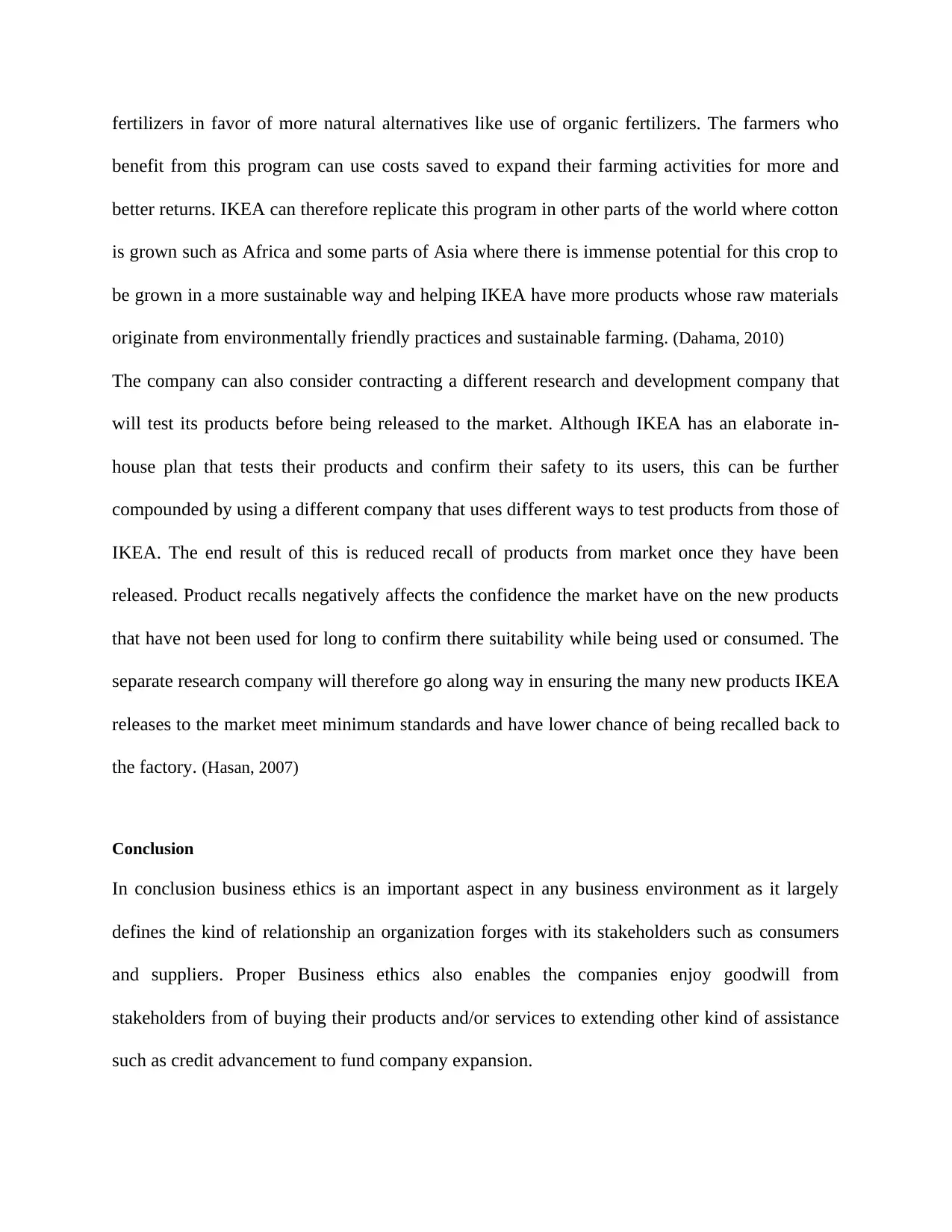
fertilizers in favor of more natural alternatives like use of organic fertilizers. The farmers who
benefit from this program can use costs saved to expand their farming activities for more and
better returns. IKEA can therefore replicate this program in other parts of the world where cotton
is grown such as Africa and some parts of Asia where there is immense potential for this crop to
be grown in a more sustainable way and helping IKEA have more products whose raw materials
originate from environmentally friendly practices and sustainable farming. (Dahama, 2010)
The company can also consider contracting a different research and development company that
will test its products before being released to the market. Although IKEA has an elaborate in-
house plan that tests their products and confirm their safety to its users, this can be further
compounded by using a different company that uses different ways to test products from those of
IKEA. The end result of this is reduced recall of products from market once they have been
released. Product recalls negatively affects the confidence the market have on the new products
that have not been used for long to confirm there suitability while being used or consumed. The
separate research company will therefore go along way in ensuring the many new products IKEA
releases to the market meet minimum standards and have lower chance of being recalled back to
the factory. (Hasan, 2007)
Conclusion
In conclusion business ethics is an important aspect in any business environment as it largely
defines the kind of relationship an organization forges with its stakeholders such as consumers
and suppliers. Proper Business ethics also enables the companies enjoy goodwill from
stakeholders from of buying their products and/or services to extending other kind of assistance
such as credit advancement to fund company expansion.
benefit from this program can use costs saved to expand their farming activities for more and
better returns. IKEA can therefore replicate this program in other parts of the world where cotton
is grown such as Africa and some parts of Asia where there is immense potential for this crop to
be grown in a more sustainable way and helping IKEA have more products whose raw materials
originate from environmentally friendly practices and sustainable farming. (Dahama, 2010)
The company can also consider contracting a different research and development company that
will test its products before being released to the market. Although IKEA has an elaborate in-
house plan that tests their products and confirm their safety to its users, this can be further
compounded by using a different company that uses different ways to test products from those of
IKEA. The end result of this is reduced recall of products from market once they have been
released. Product recalls negatively affects the confidence the market have on the new products
that have not been used for long to confirm there suitability while being used or consumed. The
separate research company will therefore go along way in ensuring the many new products IKEA
releases to the market meet minimum standards and have lower chance of being recalled back to
the factory. (Hasan, 2007)
Conclusion
In conclusion business ethics is an important aspect in any business environment as it largely
defines the kind of relationship an organization forges with its stakeholders such as consumers
and suppliers. Proper Business ethics also enables the companies enjoy goodwill from
stakeholders from of buying their products and/or services to extending other kind of assistance
such as credit advancement to fund company expansion.
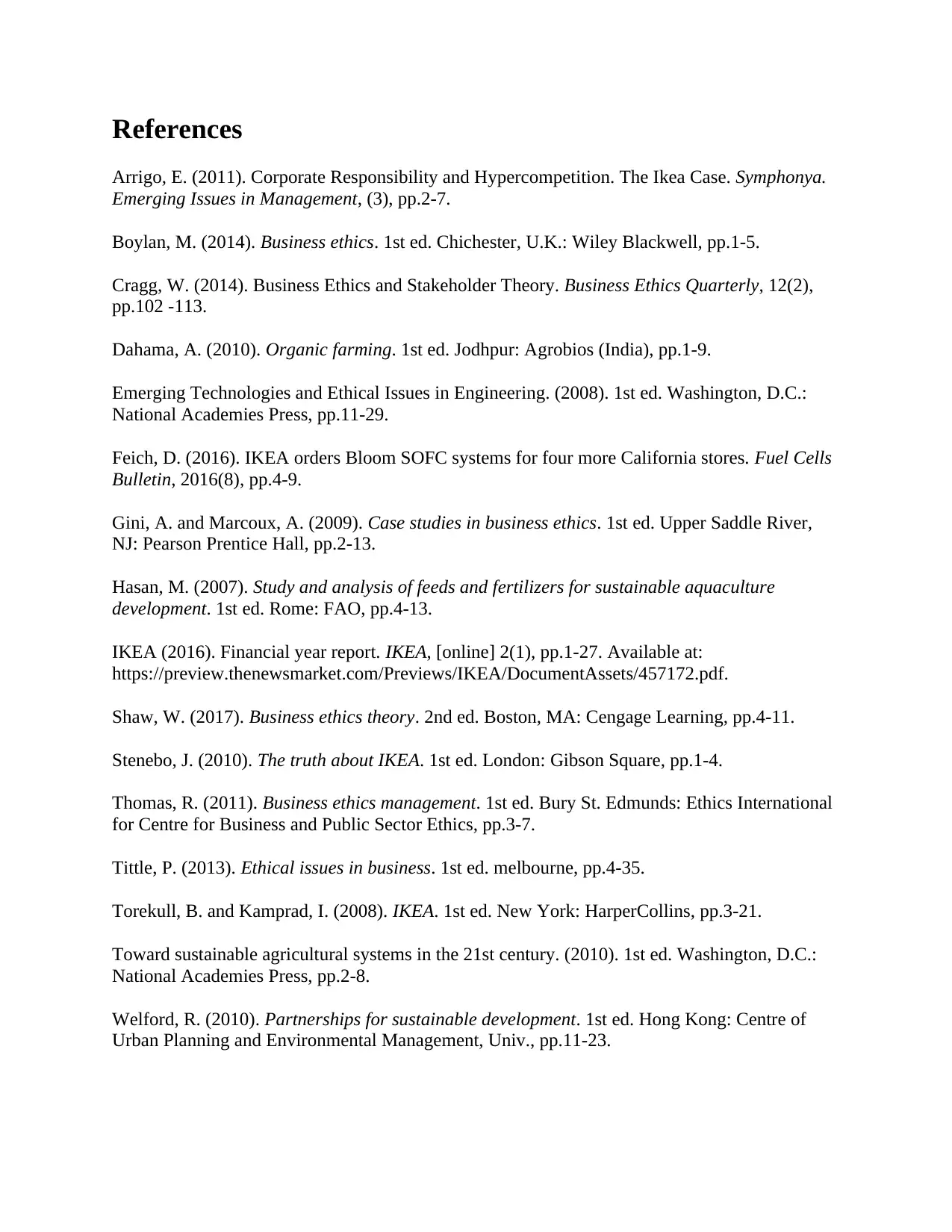
References
Arrigo, E. (2011). Corporate Responsibility and Hypercompetition. The Ikea Case. Symphonya.
Emerging Issues in Management, (3), pp.2-7.
Boylan, M. (2014). Business ethics. 1st ed. Chichester, U.K.: Wiley Blackwell, pp.1-5.
Cragg, W. (2014). Business Ethics and Stakeholder Theory. Business Ethics Quarterly, 12(2),
pp.102 -113.
Dahama, A. (2010). Organic farming. 1st ed. Jodhpur: Agrobios (India), pp.1-9.
Emerging Technologies and Ethical Issues in Engineering. (2008). 1st ed. Washington, D.C.:
National Academies Press, pp.11-29.
Feich, D. (2016). IKEA orders Bloom SOFC systems for four more California stores. Fuel Cells
Bulletin, 2016(8), pp.4-9.
Gini, A. and Marcoux, A. (2009). Case studies in business ethics. 1st ed. Upper Saddle River,
NJ: Pearson Prentice Hall, pp.2-13.
Hasan, M. (2007). Study and analysis of feeds and fertilizers for sustainable aquaculture
development. 1st ed. Rome: FAO, pp.4-13.
IKEA (2016). Financial year report. IKEA, [online] 2(1), pp.1-27. Available at:
https://preview.thenewsmarket.com/Previews/IKEA/DocumentAssets/457172.pdf.
Shaw, W. (2017). Business ethics theory. 2nd ed. Boston, MA: Cengage Learning, pp.4-11.
Stenebo, J. (2010). The truth about IKEA. 1st ed. London: Gibson Square, pp.1-4.
Thomas, R. (2011). Business ethics management. 1st ed. Bury St. Edmunds: Ethics International
for Centre for Business and Public Sector Ethics, pp.3-7.
Tittle, P. (2013). Ethical issues in business. 1st ed. melbourne, pp.4-35.
Torekull, B. and Kamprad, I. (2008). IKEA. 1st ed. New York: HarperCollins, pp.3-21.
Toward sustainable agricultural systems in the 21st century. (2010). 1st ed. Washington, D.C.:
National Academies Press, pp.2-8.
Welford, R. (2010). Partnerships for sustainable development. 1st ed. Hong Kong: Centre of
Urban Planning and Environmental Management, Univ., pp.11-23.
Arrigo, E. (2011). Corporate Responsibility and Hypercompetition. The Ikea Case. Symphonya.
Emerging Issues in Management, (3), pp.2-7.
Boylan, M. (2014). Business ethics. 1st ed. Chichester, U.K.: Wiley Blackwell, pp.1-5.
Cragg, W. (2014). Business Ethics and Stakeholder Theory. Business Ethics Quarterly, 12(2),
pp.102 -113.
Dahama, A. (2010). Organic farming. 1st ed. Jodhpur: Agrobios (India), pp.1-9.
Emerging Technologies and Ethical Issues in Engineering. (2008). 1st ed. Washington, D.C.:
National Academies Press, pp.11-29.
Feich, D. (2016). IKEA orders Bloom SOFC systems for four more California stores. Fuel Cells
Bulletin, 2016(8), pp.4-9.
Gini, A. and Marcoux, A. (2009). Case studies in business ethics. 1st ed. Upper Saddle River,
NJ: Pearson Prentice Hall, pp.2-13.
Hasan, M. (2007). Study and analysis of feeds and fertilizers for sustainable aquaculture
development. 1st ed. Rome: FAO, pp.4-13.
IKEA (2016). Financial year report. IKEA, [online] 2(1), pp.1-27. Available at:
https://preview.thenewsmarket.com/Previews/IKEA/DocumentAssets/457172.pdf.
Shaw, W. (2017). Business ethics theory. 2nd ed. Boston, MA: Cengage Learning, pp.4-11.
Stenebo, J. (2010). The truth about IKEA. 1st ed. London: Gibson Square, pp.1-4.
Thomas, R. (2011). Business ethics management. 1st ed. Bury St. Edmunds: Ethics International
for Centre for Business and Public Sector Ethics, pp.3-7.
Tittle, P. (2013). Ethical issues in business. 1st ed. melbourne, pp.4-35.
Torekull, B. and Kamprad, I. (2008). IKEA. 1st ed. New York: HarperCollins, pp.3-21.
Toward sustainable agricultural systems in the 21st century. (2010). 1st ed. Washington, D.C.:
National Academies Press, pp.2-8.
Welford, R. (2010). Partnerships for sustainable development. 1st ed. Hong Kong: Centre of
Urban Planning and Environmental Management, Univ., pp.11-23.
⊘ This is a preview!⊘
Do you want full access?
Subscribe today to unlock all pages.

Trusted by 1+ million students worldwide
1 out of 12
Related Documents
Your All-in-One AI-Powered Toolkit for Academic Success.
+13062052269
info@desklib.com
Available 24*7 on WhatsApp / Email
![[object Object]](/_next/static/media/star-bottom.7253800d.svg)
Unlock your academic potential
Copyright © 2020–2026 A2Z Services. All Rights Reserved. Developed and managed by ZUCOL.




